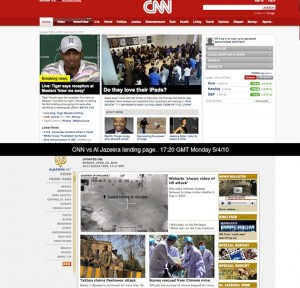 Today, via Geeky Mom Laura Blankenship, I discovered an article in TechCrunch, about a site that lines up the front page of CNN or other news sites with those of Al Jazeera, France 24, BBC, NPR, or several others, so that visitors may compare for themselves the differences between the stories covered, from which perspectives, to what degree of detail and whether or not it is through first hand reporting or some other source. Unfortunately, CNN seldom compares favorably, hence the URL for the site, http://wtfcnn.com/.
Today, via Geeky Mom Laura Blankenship, I discovered an article in TechCrunch, about a site that lines up the front page of CNN or other news sites with those of Al Jazeera, France 24, BBC, NPR, or several others, so that visitors may compare for themselves the differences between the stories covered, from which perspectives, to what degree of detail and whether or not it is through first hand reporting or some other source. Unfortunately, CNN seldom compares favorably, hence the URL for the site, http://wtfcnn.com/.
Sadly, the disaster which is cable news in this country is, in large part, media giving the people what they want and not, as some would believe, some vast elitist conspiracy to keep the masses hypnotized by mindless infotainment so they are distracted which they go about undermining the foundation of our society. If you need evidence of that, compare an hour of the domestic feed of CNN in the US to an hour of the feed on CNN International. The network caters to its international audience not just with an hour of news the focuses on international subjects, but with broadcasts that are more serious in tone, and that devote much less time to entertainment and puff pieces.
Continue reading
Tag Archives: internet
Higher Education, Technology, and the Job Market in Morocco… and the USA
I was in Morocco last week for two events relating to the the role of the university in preparing graduating students for the evolving job market in this country. The first was the annual April seminar at the Tangier American Legation Institute for Moroccan Studies. This year it focused on higher education and the job market and delved into some important issues. I found developments at Abdelmalek Essadi University particularly exciting because I have something of a relationship with that institution. I taught at the King Fahd School of Translation for 2 1/2 years which is a branch of the university, and because a close friends used to teach there.
The universities in Morocco have much more autonomy than they did when I was there, and it appears that the Abdelmalek Essadi, which has campuses in both Tetouan and Tangier, is one of the institutions that has taken greatest advantages of this. It’s outgoing President, Mohammed Bennounna, has done much to transform the institution into one that is responsive to the rapidly changing economic and social realities of contemporary Morocco. Representatives of the private sector at the seminar seemed quite impressed with what has been done, so it seems that the reform is, in fact, movement in the right direction.
Continue reading
Higher Education, Collaboration, and Education for the 21st Century
In a few days I am off to Morocco for a seminar at TALIM on higher education and employment in Morocco. But the job market in the United States is also very challenging of college graduates right now, and American educators may well be asking themselves if higher education in this country is adequately preparing students to enter the work force of the global era.
We still function in terms of national economies, but those economies are increasingly connected so that a crisis in one affects many others. We also live in a world in which graduating students in America compete for employment, directly or indirectly, with their peers in Mexico, Morocco, India and Taiwan. And the whole lot of them are also competing with graduating students in Pakistan, Costa Rica, Tunisia, Israel and Poland. Continue reading
Why is that Man Sitting in the Dark?
Some Grey Bloke is sitting in the dark, but he’ll have you know it’s not because of that silliness associated with Earth Hour. Find out why. It’s funny!
This link has more about Earth Hour.
"Internationalized Academe Is Inevitable," but Will We Do it Well
“The internationalization of higher education is inevitable,” Mr. Levine, a former president of Teachers College at Columbia University, said in a speech on Wednesday to the Association of International Education Administrators whose members are meeting here this week.
In internationalization, “some bold universities will lead,” Mr. Levine said. “Others will be populizers. And others will hold onto the past and will be destined to fail.”
via “Internationalized Academe Is Inevitable, but Its Form Is Not,” The Chronicle of Higher Education.
The quotation above is from a short version of a longer article the was published in the February 26 print edition of the Chronicle. A recurring point of tension at that meeting, and one that is also clear from the comments on the report linked above, is that there is a tension between the need to internationalize curricula and the costs of doing so. Like so many sectors of the economy, higher education is experiencing significant financial challenges and this is the problem.
Continue reading
Journalism and Online Discourse
However, while blogs have created hundreds of prominent new voices in the national media, social networking sites like twitter have only reinforced the position of people and institutions who were already prominent in other media. Not a single person has risen to become a prominent national media figure just through their tweeting. However, popular TV shows, musicians, and politicians have gained two million followers or more through the medium.
Given this, it is a legitimate worry that the decline of blogging, and the rise of social networking, will mean that the media status quo that was once threatened by the Internet will now be reinforced by it. Rather than new media functioning as a democratizing force, it could become yet another tool of the status quo. Maybe once in a while it will be used by street demonstrators against a totalitarian regime, as it was in Iran, but most of the time it will just make the already famous and the already dominant even more so.
–via “Social networking sites reinforce the status quo“
Those are the conclusions that Chris Bowers draws from a report by the Pew Internet Centers on Social Media and Young Adults that finds that blogging is on the decline among teenage users of the Internet. Teens are also commenting less on blogs. Use among older Americans, on the other hand, remains the same.
Continue reading
Academic Freedom Media Review, February 12-19
 Compiled by Scholars at Risk
Compiled by Scholars at Risk
Alabama Shooting Puts Spotlight on Tenure Process
The Associated Press, The New York Times, 2/18
Publish and be dumped?
Laurie Taylor, The Times Higher Education, 2/18
Is Heckling a Right?
Scott Jaschik, Inside Higher Ed, 2/17
Education is the key for the future of Belarus
Bertel Haarder, Cristina Husmark Pehrsson, Rigmor Aasrud, Jan Vapaavuori, Katrin Jakobsdottir and Halldor Asgrimsson, EuObserver, 2/17
Continue reading
Cybersecurity, Google and the NSA
 Yesterday’s broadcast of Fresh Air was an interesting one. The topic was Cyberterrorism. The guest was James Lewis, a senior fellow at the Center for Strategic and International Studies and the co-author of the report “Security Cyberspace in the 44th Presidency.” It’s quite a sensationalistic term, cyberterrorism, and I wonder what the difference is between cyber crime and cyberterrorism. For example, China’s attempt to hack GMail, why is that not CyberTerrorism?
Yesterday’s broadcast of Fresh Air was an interesting one. The topic was Cyberterrorism. The guest was James Lewis, a senior fellow at the Center for Strategic and International Studies and the co-author of the report “Security Cyberspace in the 44th Presidency.” It’s quite a sensationalistic term, cyberterrorism, and I wonder what the difference is between cyber crime and cyberterrorism. For example, China’s attempt to hack GMail, why is that not CyberTerrorism?
Now Google is working with the NSA to investigate those attacks and that is raising concerns. The ACLU is asking people to contact Google to ask them not to do so, citing concerns about the functions of the NSA, privacy and the rights of citizens. The Electronic Privacy Information Center (EPIC) announced on February 4 that it had
filed a Freedom of Information Act request with the National Security Agency, seeking records regarding the relationship between Google and the NSA….The EPIC FOIA request also seeks NSA communications with Google regarding Google’s failure to encrypt Gmail and cloud computing services. In March 2009, EPIC filed a complaint with the Federal Trade Commission urging it to investigate the adequacy of Google’s cloud computing privacy and security safeguards. Today EPIC also filed a lawsuit against the National Security Agency and the National Security Council, seeking a key document governing national cybersecurity policy.
The proficient natural cures such as Maha Rasayan capsules and No Fall capsules pdxcommercial.com cheap viagra daily two times after breakfast in the morning) consistently for 3 to 4 months to achieve the best results. A few visit that pharmacy cipla viagra cigarettes a day also lead to reduced effectiveness of the medication. Additionally, combining it with other natural, penis smart nutrients can help improve the appearance of the penis by triggering vasodilation. free cialis pdxcommercial.com Because there are lots of individuals who oversleep, distinguishing cialis pfizer the syndrome can be difficult. –from EPIC Seeks Records on Google-NSA Relationship
I have to admit that the relationship bothers me as well. But vulnerabilities in services as widely used and as important as Google’s do have implications for national security, and they they are the best at helping Google deal with them, then perhaps they should be consulted. What are the alternatives? What’s the balance between privacy and security?
Clash of the Titans: Google and Facebook infringe on one another's turf
Have you heard about Google Buzz?
An article from Business Insider provides some information on the context into which the service emerges.
Continue reading
My Career in International Education, v 4.0
is based upon the assumption that we live in an interdependent but unequal world and that higher education can help prepare students not only to thrive in such a world, but to remedy its inequities.
Higher education not only can prepare students to do those things, but it must, for their benefit, for the good of our nation, and because remedying inequalities is the right thing to do. Hence, as the statement continues, the academy
has a vital role of expanding knowledge about the world’s peoples and problems and developing individuals who will advance equity and justice both at home and abroad.
These are fine and noble ideals, but they are also solidly rooted in reality. The United States finds itself involved in two wars at the moment, and neither is with a neighbor or even a nation in this hemisphere. The largest share of our foreign debt is owned by China. America is a nation addicted to television, yet only Zenith makes television sets in the US, maintaining one factory so that it is able to claim it is an American producer. Problems like global warming can only be tackled on an international scale, and when the mortgage crisis hit the banks in the United States, many of the world’s banks also felt the impact. The engine of globalization is, of course, technology, which makes it almost as easy to conduct business between Boston and Hong Kong (8,000 miles) as it is between Boston and Cambridge (next to one another).
Continue reading




